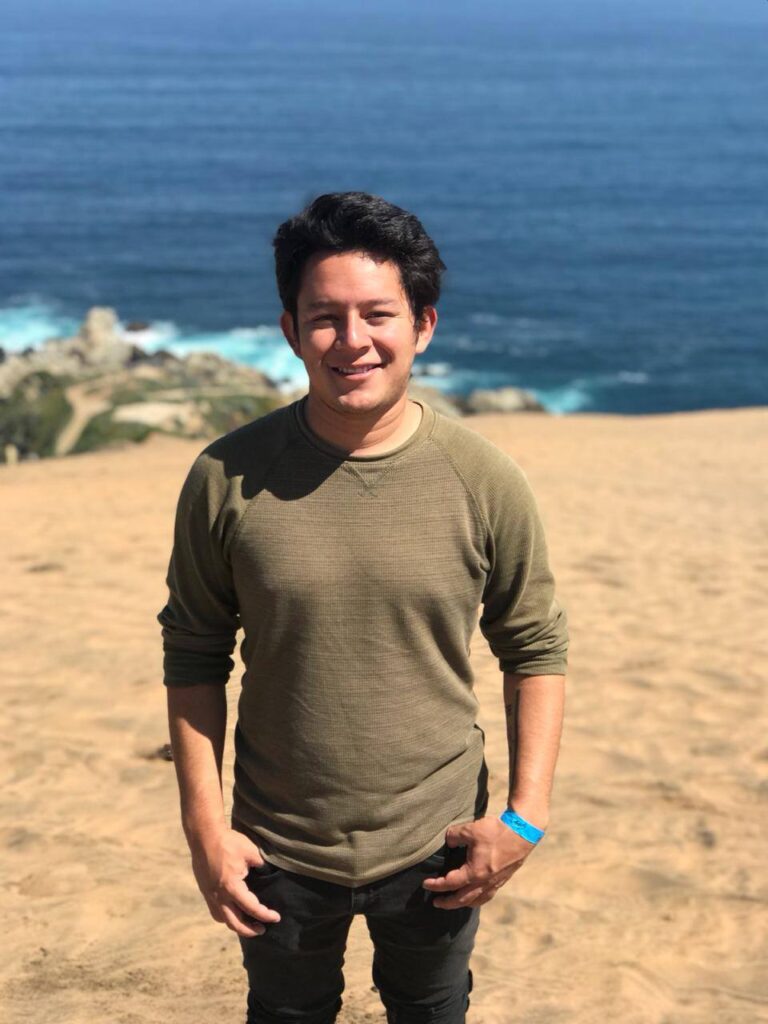Antonio Ojeda: en el desvelo del destierro y la marea

TENGO FE
Tú lo sabes bien,
que no creo en la figura
que en la cara nos dibuja
la soberbia de mirarnos y creer:
que el cielo está en los pies,
el mar en las ideas,
las islas, en nuestra soledad;
que siempre habrá agua, pan y mesa.
Me rehúso a ignorar,
mas tengo fe.
No sé bien si a razón
de aprehender algún consuelo
o por no desvanecer el día de lo que hoy
con toda fuerza más anhelo:
el abrir los ojos sin vestigios y verlos
otra vez.
Mis intentos se reducen a ceder
yendo adormecido a cada nuevo evento antiguo
esperando despertar
sin vivir estacado en la farsa al mediodía,
pues,
si mi mejor poema yace muerto,
si está escrito o vivido,
mutilado o extraviado,
no lo sé.
Poema menor, oficio menor,
sujeto menor;
si hay algo que puedo ser
que sea un día sin esperar que
La poesía
me sea fiel.
I HAVE FAITH
You know it well,
I don’t believe in the figure
that draws us on the face
the pride of looking at ourselves and believe:
that the sky is on the feet,
the sea in ideas,
the islands, in our solitude;
that there will always be water, bread and a table.
I refuse to ignore
but I have faith.
I do not know if to reason
to apprehend some consolation
or not to fade the day of what today
with all strength more longing:
to open the eyes without vestiges and see them
once again.
My attempts come down to giving in
going numb to every new old event
waiting to wake up
without living stuck in the farce at noon,
because,
if my best poem lies dead,
if it is written or lived,
mutilated or lost,
I do not know.
Minor poem, minor office,
minor subject;
if there is something I can be
let it be a day without waiting for
The poetry
be faithful to me.
2. EN EL FONDO
El fondo de los fondos
no es el más oscuro
de los peajes, de los pozos.
Puede ser agua cálida,
río corriente,
mar inexplorado.
Puede ser paraje
en el sitio de una roca oceánica,
en el desvelo del destierro y la marea,
en el puerto último
de la playa más blanca
con los cielos más oscuros.
Aquí habita el saber que no podrás
nadar contra corriente al horizonte.
El fondo de los fondos
puede haber sido ya logrado
y ver, como un ave vieja,
que no habrá más
otro vuelo migratorio.
IN THE BACKGROUND
The fund of funds
is not the darkest
of tolls, of wells.
It can be warm water
running river,
unexplored sea.
It can be a place
at the siege of an oceanic rock,
in the wakefulness of the exile and the tide,
in the last port
from the whitest beach
with the darkest skies.
Here dwells the knowledge that you will not be able
to swim against the current to the horizon.
The fund of funds
may have already been achieved
and see, like an old bird,
that there will be no more
another migratory flight.
LA VID
El hombre retira una espiga
de la palma de un ave de cera
robando sus vocablos.
Una mujer guarda mi fotografía
sin revelar en aguas rojas
y deja mi grabado en un arroz.
Olvidé la llave que abre la mitad
de una puerta al sur del ático
y el rostro deja de ser mío.
—La Vid— brota mojando
a las quimeras en la cara.
Yo me encorvo
y escribo con una espina
el epitafio de un apóstol
que jamás fue mártir.
THE VINE
The man removes a spike
from the palm of a wax bird
stealing its words.
A woman keeps my photograph
undisclosed in red waters
and leave my engraving on a rice.
I forgot the key that opens half
from a door on south of the attic
and the visage is no longer mine.
—The Vine— sprouts wetting
to chimeras in the face.
I stoop
and I write with a thorn
the epitaph of an apostle
that was never a martyr.
EL POZO
Contengo las rampas
cuando me veo atado al sustantivo.
En un camino con seis fuentes,
junto al río de linaje perdido,
me incliné para ahogar a cada rostro,
buscando su silencio.
Fatídico intento para la voluntad;
las lágrimas transmutaron en verbo.
Tomé una rama de la playa
y te escribí
con las cenizas mudas
de seis voces en mi boca.
THE WELL
I contain the ramps
when I see myself tied to the noun.
On a road with six fountains,
by the river of lost lineage,
I bent down to drown each face
looking for their silence.
Fateful attempt for the will;
the tears transmuted into verb.
I took a branch from the beach
and I wrote you
with the silent ashes
of six voices in my mouth.
POÉTICA EN LA LÁPIDA
Podría estar a cargo del relato
sobre el curso del futuro venidero;
mas tengo que cumplir con mi labor
donde se ahogan las noches vencidas
en mi propio cementerio, mi patíbulo,
mi panteón de glorias y fracasos.
Ese vaivén es más antiguo
que el primer hombre ante
la sepultura de su cuerpo,
no así de la resonancia
de su ausencia:
primero en piedra
luego en papel,
después
será tarde.
POETRY IN THE STONE
I could be in charge of the story
about the course of the future to come;
but I have to do my job
where the defeated nights drown
in my own cemetery, my gallows,
my pantheon of glories and failures.
That sway is older
that the first man before
the burial of his body,
not so from the resonance
of his absence:
first in stone
then on paper,
after
it will be late.
(Poemas inéditos enviados y traducidos por el autor para La libélula vaga)
Antonio Ojeda (México, 1997) es egresado de la Licenciatura en Lengua y Literatura Hispánicas de la Universidad Autónoma del Estado de México. Cursó sus estudios superiores en el Centro Universitario UAEM Amecameca de 2015 a 2019. Participó en el Programa de Movilidad Estudiantil otoño 2018 donde aplicó como estudiante de intercambio para la Facultad de Ciencias Sociales y Humanidades de la Universidad de Chile donde reafirmó su interés por la poesía y la difusión de la literatura en general; estos hechos le motivaron a fundar y dirigir la revista electrónica de literatura Hiedra, la cual inició sus publicaciones el 22 de mayo de 2020 y que le ha permitido colaborar con escritores y poetas de México, Latinoamérica y el mundo. Escribe canciones y musicaliza poemas de su autoría. Algunos de sus textos han sido publicados por la revista Norte/Sur (México) y la revista Altazor de la Fundación Vicente Huidobro (Chile).
Antonio Ojeda (Mexico, 1997) is a graduate of the BA in Hispanic Language and Literature from the Universidad Autónoma del Estado de México. He completed his higher studies at the Centro Universitario UAEM Amecameca 2015 to 2019. He participated in the Fall 2018 Student Mobility Program where he applied as an exchange student for the Faculty of Social Sciences and Humanities of the University of Chile where he reaffirmed his interest in poetry and the dissemination of literature in general; these events motivated him to found and direct the electronic literature magazine Hiedra, which began its publications on May 22, 2020 and has allowed him to collaborate with writers and poets from Mexico, Latin America and the world. He writes songs and musicalizes poems of his own. Some of his texts have been published by the magazine Norte / Sur (México) and the Altazor magazine of the Vicente Huidobro Foundation (Chile).

